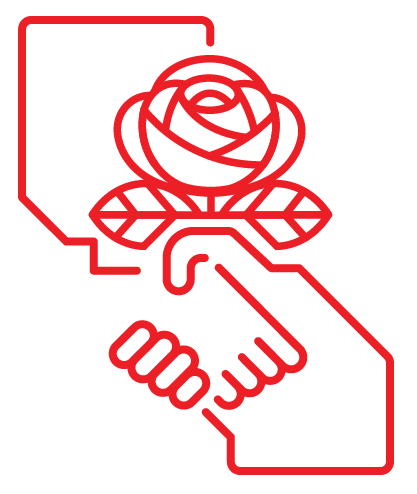Banners Across the West Coast Call Out Chevron’s Ties to Genocide and Climate Change
Banners on Berkeley overpass. Photo, Leon Kunstenaar
Coordinated banner drops at 25+ sites escalate DSA boycott targeting Chevron’s Israel portfolio
DSA chapters from Seattle to San Diego joined dozens of autonomous pro-Palestine and Climate Justice groups on August 29 to stage a coordinated banner drop at more than 25 locations across the West Coast. The action grew out of the escalating boycott of Chevron, linking everyday fuel purchases to the company’s role in enabling human rights abuses in Gaza.
“The genocide in Gaza involves many actors,” said Tim Husarik, a San Diego DSA member. “Chevron is among the most complicit—profiting from destruction—so building support for boycott, divestment, and sanctions is essential in the imperial core.”
Comrades on overpass in San Diego
The banner drop
Chapters unfurled banners and handed out flyers urging neighbors to join the boycott and to ask Chevron franchise owners to press corporate leadership to end business in Israel. Local actions were autonomous, but timing and messaging were coordinated to maximize visibility and underscore a sustained, multi-chapter campaign. “The banner drop was a good tactic,” said Bonnie Lockhart, an East Bay DSA member. “Small groups could pull it off with a few people, and larger groups could span multiple sites or draw a crowd on an overpass to create drama and space to plan next steps.” These banner drops are part of the broader #StopFuelingGenocide campaign, of which our national DSA International Committee is a leading coalition member. The coalition has staged protests in more than 20 U.S. cities at Chevron gas stations, refineries, and corporate offices. At stations, volunteers have asked drivers to fill up elsewhere and sign the boycott pledge—an effort that has drawn tens of thousands of consumer commitments since launch.
Why Chevron and why now
According to the American Friends Service Committee, after acquiring Noble Energy in 2020, Chevron became the operator of the Tamar field and a major partner at Leviathan, making it Israel’s largest natural gas producer. In 2023, the company earned an estimated $1.5 billion from these projects while Israel collected roughly $820 million in royalties and fees. About 71 percent of Israel’s electricity that year came from fossil gas, with roughly two-thirds supplied from Tamar under contract to the state-owned Israel Electric Corporation through 2030. Chevron also operates and partially owns the East Mediterranean Gas (EMG) pipeline, which links Israel and Egypt. The Palestinian-led Boycott, Divestment, and Sanctions (BDS) movement has since elevated Chevron as a strategic boycott target in light of its role in operating Israel’s gas fields and exporting to regional markets. Electricity generated from Chevron-supplied gas powers military bases, prisons, police, and illegal settlements via the Israel Electric Corporation. Control over generation and transmission has repeatedly been used against Palestinians through exclusionary service and punitive restrictions. Offshore, the Israeli Navy has tightened Gaza’s maritime blockade in part to secure the Tamar rig and the nearby EMG pipeline—further devastating coastal livelihoods.
One of the boycott’s innovations is to tie the human rights abuses in Palestine to the growing devastation of climate change. Chevron’s investment in Israel not only enables genocide, but it also contributes to the broader degradation of the planet. Long-term supply contracts and new pipeline capacity lock in fossil dependence through at least the 2030s, crowding out renewables and delaying decarbonization. The same chains that power military bases and settlements in Israel also contribute to the heat waves, wildfires, and floods facing communities around the world.
Franchisee strategy
The campaign focuses on Chevron’s franchise network as a locally rooted pressure point. Petitions delivered to station owners make a neighbor-to-neighbor ask: sign a letter urging Chevron to exit Israel and post a statement condemning the company’s role in genocide. Franchisees who sign the letter and post a notice will not be picketed, keeping pressure focused on Chevron’s corporate decision-makers rather than small business owners. A parallel sign-on letter from franchisees frames the issue as brand and revenue risk—boycotts and protests harm independent operators—pressing corporate leadership to end the practices that generate that risk.
What’s next
The boycott will continue until Chevron ceases operations in Israel and ends business practices that enable human rights abuses in Gaza. That means sustained station outreach, more franchisee sign-ons, and visible actions that grow the boycott’s base. Since October 2023, Chevron has repeatedly shut the Tamar field and scaled back exports; expansion at Leviathan and proposed pipelines have been halted or postponed, and Egyptian buyers have sought alternatives. The company’s own filings warn that future impacts on production and revenue remain uncertain—uncertainty we aim to leverage through neighbor-to-neighbor organizing. To build momentum, the coalition is coordinating additional action that links Palestine solidarity groups with climate-justice, labor, and Indigenous organizers—using station-level outreach to pressure corporate, fighting for a more just and sustainable future.
West Coast coordination of actions will continue, and we urge CA DSA comrades to get involved. As Eddie Vcelikova of DSA Los Angeles put it, “I found it really inspiring to think that a car could drive from Orange County to Bakersfield and hit four banner drops, all about how Chevron is complicit in genocide. I think these organized actions show power. The unified message is hard to ignore.”
To learn more about DSA’s Stop Fueling Genocide campaign and to join the West Coast Boycott Chevron coalition, contact climate-action@eastbaydsa.org


